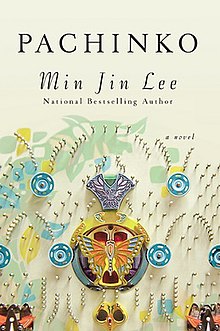Our second book of the month is Pachinko by Min Jin Lee. It’s a family saga about a Korean family living through post-war in Japan, and facing all the hurdles that come with it. Written with complexity and detail, this book justifies its place as a microcosm of the Korean diaspora.

Title: Pachinko
Author: Min Jin Lee
Published: February 7, 2017
Genre: Asian Literature, English, Fiction, Historical Fiction, Japan, Korean War, Korean-American Author, Literary Fiction, World War II
Rating: 🌟🌟🌟🌟🌟
Summary
In the early 1900s, Sunja, the cherished daughter of a disabled fisherman, falls for a wealthy man she meets by the sea in Korea. When she finds out she’s pregnant and that he’s married, she rejects his offer to support her. Instead, she marries a kind but ill minister who is moving to Japan. Her choice to leave her home and her son’s father starts a story that unfolds across generations.
Review
The themes of this book revolve around sex, beauty, wealth, and the impact of one’s origins, all of which shape the narrative. These elements are explored exceptionally well, and the level of complexity is admirable. The book delivers on all fronts.
The writing is absolutely stunning. The author uses common Japanese expressions written in English characters like “Soo neee” which I found to be a smart move. This detail makes the reading experience feel more authentic.
The book spans generations, showing the family’s progress over time. You see the changes in Korea under Japanese rule, the way Koreans were treated, and how things shifted as they gained wealth. The passage of time is depicted through small details like the appliances they own, reflecting how far they’ve come.
I especially loved how the women are portrayed—super intelligent, incredibly hardworking, and facing numerous obstacles.
“Sunja-ya, a woman’s life is endless work and suffering. There is suffering and then more suffering. It’s better to expect it, you know. You’re becoming a woman now, so you should be told this. For a woman, the man you marry will determine the quality of your life completely. A good man is a decent life, and a bad man is a cursed life—but no matter what, always expect suffering, and just keep working hard. No one will take care of a poor woman—just ourselves.”
The characters are lovable and I connected to them well enough to miss them after finishing this book. I feel proud of how far this family has come—from being dirt poor and nearly beggars to overcoming everything they endured and where they ended up.
There’s also a lot of internal struggle, which I found fitting. The characters wrestle with identity, feeling like they don’t belong anywhere, and searching for home and comfort during times of uncertainty. This struggle is realistic and handled well in this book.
Final Thoughts
I’m neither Korean nor have I immigrated to a different place, but I think this book covers almost everything a person would face when forced to leave their homeland during a crisis. The discrimination, loss of identity, and the extreme challenges of adapting to a place where you’re not welcome are explored in detailed and complex ways.
I find this book incredibly beautiful and hope that one day, a Filipino diaspora novel written with such finesse and execution will also be published.
I highly recommend this book to all readers, regardless of your preferred genre. It’s a valuable source of knowledge and offers great empathetic storytelling about feeling alienated from your birthplace. If you love historical fiction, you’ll adore this. Literary fiction readers, this is a must-have on your list.
If you’ve read this book, I’d love to hear what you think! I loved it and highly recommend it. If you feel the same, leave a heart emoji in the comments! 💙
Leave a Reply